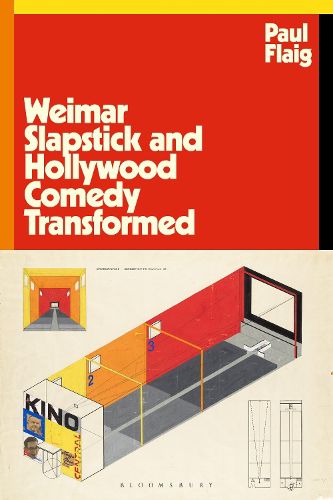Readings Newsletter
Become a Readings Member to make your shopping experience even easier.
Sign in or sign up for free!
You’re not far away from qualifying for FREE standard shipping within Australia
You’ve qualified for FREE standard shipping within Australia
The cart is loading…






From cabaret songs inspired by Buster Keaton to Mickey Mouse's diagnosis as a "melo-maniac," Weimar Slapstick and Hollywood Comedy Transformed explores the extraordinary appeal of American slapstick, cartoon, and screwball comedies during and after Germany's Weimar Republic. Bridging two crucial sites of interwar modernity, Paul Flaig offers a fundamental reassessment of Weimar culture, Hollywood comedy, and their intertwined legacies.
Through a series of comic pairings-including Harold Lloyd and Curt Bois, Felix the Cat and psychotechnics-Flaig investigates the aesthetic, political and sexual forces that shaped Weimar Germany's fascination with American film comedies, as they were taken up and transformed by German filmmakers, philosophers, advertisers, artists, and politicians. Examining a wide range of sources-including films, manifestoes, arts journals, feuilletons, and trade press reports-he underscores the essential and diverse contributions of Weimar culture to our understanding of these comic laboratories of modernity.
$9.00 standard shipping within Australia
FREE standard shipping within Australia for orders over $100.00
Express & International shipping calculated at checkout
Stock availability can be subject to change without notice. We recommend calling the shop or contacting our online team to check availability of low stock items. Please see our Shopping Online page for more details.
From cabaret songs inspired by Buster Keaton to Mickey Mouse's diagnosis as a "melo-maniac," Weimar Slapstick and Hollywood Comedy Transformed explores the extraordinary appeal of American slapstick, cartoon, and screwball comedies during and after Germany's Weimar Republic. Bridging two crucial sites of interwar modernity, Paul Flaig offers a fundamental reassessment of Weimar culture, Hollywood comedy, and their intertwined legacies.
Through a series of comic pairings-including Harold Lloyd and Curt Bois, Felix the Cat and psychotechnics-Flaig investigates the aesthetic, political and sexual forces that shaped Weimar Germany's fascination with American film comedies, as they were taken up and transformed by German filmmakers, philosophers, advertisers, artists, and politicians. Examining a wide range of sources-including films, manifestoes, arts journals, feuilletons, and trade press reports-he underscores the essential and diverse contributions of Weimar culture to our understanding of these comic laboratories of modernity.